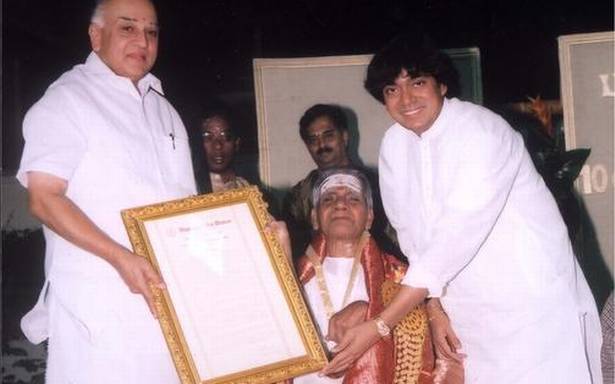The legendary vocalist was known for his childlike enthusiasm to teaching Carnatic music
Vocalist, veena player, teacher and composer Thanjavur V. Sankara Iyer died in Tirunelveli on Thursday. He was 98.
Sankara Iyer was probably one of the few musicians who remained a link between glorious years of Carnatic music, which flourished on the banks of the Cauvery and subsequent generations of talent. He had a childlike enthusiasm when it came to teaching music and used to sing endlessly. A bachelor, he lived with his nephew R. Chandrasekaran in Tirunelveli for 15 years after suffering a stroke.
“Whenever a young musician called on him, he would first ask his name. Then he would ask him to sing and would promptly join him. He would go on explaining the nuances of the raga and the keerthana and he never asked money from any student,” recalled nagaswaram player Injikudi E.M. Subramanian, who learnt from Sankara Iyer when he was teaching in Annamalai University.
A colourful raconteur, he would narrate the anecdotes behind his compositions. He once explained why he included Megharanjani, one of the four Ranjanis in his Ranjanimala Keerthana. “I was waiting for a train in a station in north India. The radio station from Karachi broadcast a performance and the singer beautifully rendered Megharanajani. I decided to include in Ranjanimala,” he once said. The other ragas of Ranjanimala are Ranjani, Sriranjani and Janaranjani.
Though born in Thogaimalai near Tiruchi and had his initial training under his grandfather Krishna Iyer, Thanjavur became inseparable from his name after he lived with his sister’s family there for many years. It was there he met and came under the influence of great musicians such as Palghat Mani Iyer, Papa Venkataramaiah, Mahalingam Pillai and T.K. Murthy.
It was during his Thanjavur days that he met nagaswaram player Tiruvavaduthurai Rajarathinam Pillai in a lodge. “Pillai had asked Sankara Iyer about his favourite raga. He wanted him to play natakapriya and the nagaswaram wizard obliged. After reaching home, he composed Geetha Vadya Natana in the raga,” Mr. Subramainan recalled Sankara Iyer as saying.
Sankara Iyer’s career took a turn when his brother-in-law made him train under Sattur Krishna Iyengar in Chennai. When his guru joined Annamalai University as a professor, Sankara Iyer too enrolled there for the “Sangita Bhushanam” course. There, besides his guru, he was guided by the likes of Tiger Varadachariar, T.K. Rangachari, Tiruppambaram Swaminatha Pillai, and Thanjavur Ponnaiah Pillai.
He came under the tutelage of Sattur Krishna Iyengar in Chennai and later joined the Sangita Bhushanam course in Annamalai University where Krishna Iyer taught in the music department. His other teachers were Tiger Varadachariar, T.K. Rangachari, Tiruppambaram Swaminatha Pillai, and Thanjavur Ponnaiah Pillai. He learnt veena from Gomathysankara Iyer and K.S. Narayanaswamy. After completing his course, he worked as a teacher in Devakottai Music School and later, the Shanmukhananda Sabha Music School in Mumbai, where he worked for several years.
He started composing songs at a young age and never used his name as mudra like other composers. “Late T.K. Govinda Rao told me that he used to sing rama namame in desh without knowing its author,” said Mr. Subramanian.
His songs such as Mahadeva Siva Sambo (Revathi) and Muruga Thirmal Maruga (Harikamboji) were popularised by late M.L. Vasantha Kumari and D.K. Jayaraman. “He composed Mahadeva in Revathi to give a keerthi soaked fully in Carnatic elements. He was of the opinion that earlier Revathi raga had a tinge of Hindustani,” explained Mr Subramanian.
He is also the author of the ever young Nalinikanthi composition Nathajana Palini.
The Music Academy conferred the Sangita Kala Acharya on him in 1996. He won the Sangeet Natak Akademi Award in 2011.
Source: Read Full Article

